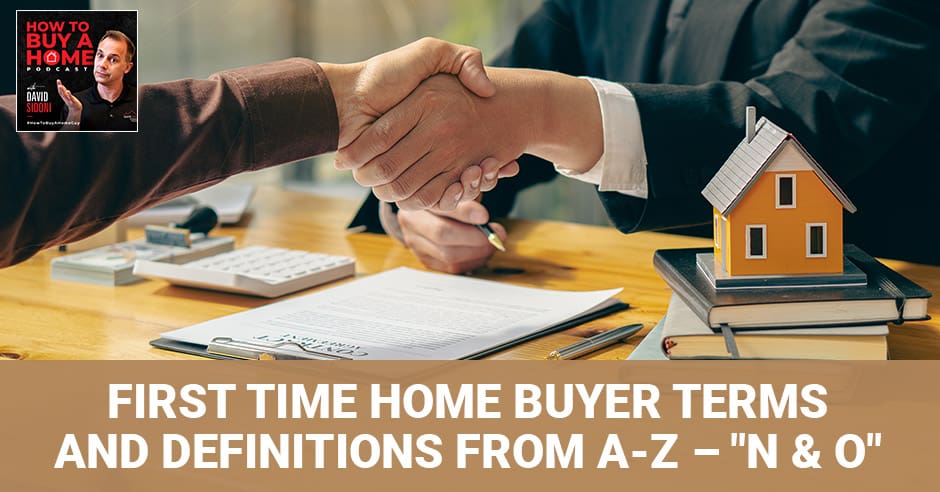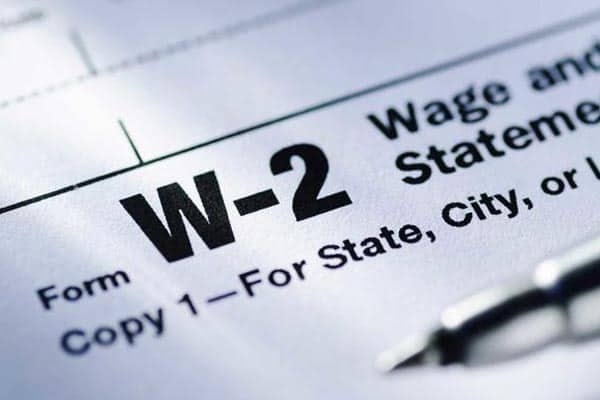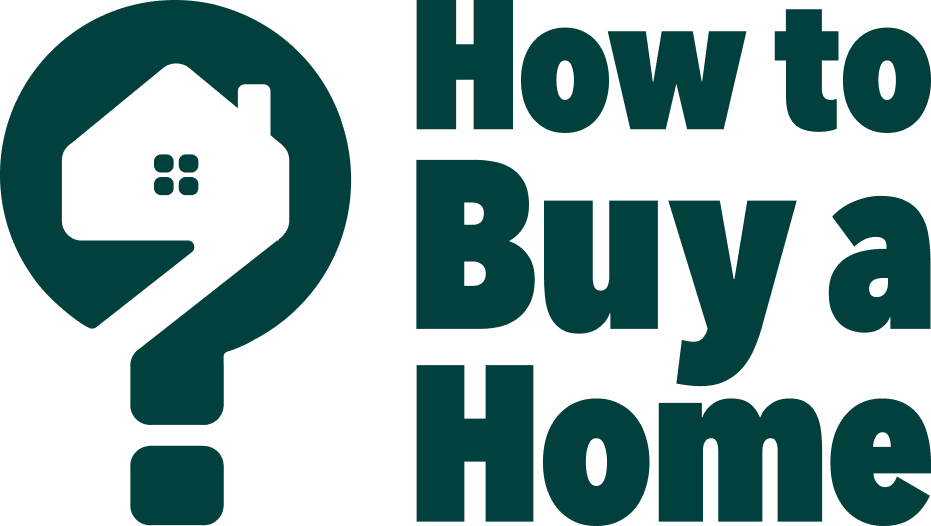
We are at the halfway point in the alphabet. Time to learn all you need to know about the letters N and O. Learn what a Net Monthly Income or an Open-Ended Credit is. Join David Sidoni on today’s N & O episode. This is not a “NO” episode, it’s a “YES” to learn about these N and O words. You are one step closer to becoming a human dictionary for buying homes.
—
First Time Home Buyer Terms And Definitions From A-Z – “N & O”
Glossary Of Terms You Need To Know When Preparing To Buy Your First House
N and O are the letters we are going to be covering in this episode. This isn’t no. It’s the letters N and O in our terms and definitions. We are trying to get you a yes, not a no. Are you confused? You won’t be after this. Let’s go.
—
What is happening, my How to Buy a Homies? It’s time for another fun field of vision of, “What does that mean?” It’s a glossary time for anyone who’s trying to decipher the lingo and the language of buying your first home. Welcome back. If you are new, this is going to be confusing because right out of the gate, I’m going to be coming at you with N and O in the middle of the alphabet. Maybe you should go back to Episode 94 and start at A at the very beginning. If you are stubborn, you are still here, and it’s your first time, this is the undisputed educational content provider for all things first-time home buyers. If you are sick of the rent cycle, you are in the right place.
NHDR & Negative Amortization
In this episode, we are going to jump right in for all the terms and the definitions for N and O. First up, NHD. That’s the Natural Hazard Disclosure. It should be NHDR because it’s the Natural Hazard Disclosure Report. This is a term you are going to hear a lot throughout the transaction, and you are going to think it’s super important. Guess what? It’s not. Once you are under contract for a home, you are going to get this giant report that looks huge. After many years of doing real estate, I know what this is going to look like. This is something you should check out, and it’s super important for you. I’m not diminishing it.
I understand why this is a thing for a real estate transaction. The way it works is that it tells you what’s going on in the area where you are buying a home. My guess is that at some point back in history, you are buying a home, somebody got reamed on a deal, and someone in the government thought that some 58-page report with plot maps, charts, and surveys would somehow protect you, the buyer. Keep this in mind. It’s only about $100, and these companies send you this giant incomprehensible support, and you are supposed to make sense of it. Sorry, I’m probably pissing off a whole bunch of people in my real estate industry.
As we know, that has never been a concern of mine. The Google definition of the Natural Hazard Disclosure Report is that, “It’s a report required by most states that discloses if the property is located in an area that has a higher risk of natural hazards.” For some reason, if you haven’t watched the news and figured out what’s going on in your neighborhood, this report will be helpful in telling you if you live in a flood hazard zone, an area of potential flooding, high fire severity, and a wind area that could substantially increase forest fires. If you are in an earthquake fault zone, which is everybody in my neighborhood, and then what they call a seismic hazard zone. What is the difference between those? I don’t know. That’s an NHD.
Our next N is Negative amortization. First, you need to know what amortization is. I am fallible. You got to know what amortization is before you get into whether or not it’s negative or positive, or if maybe it’s not negative or positive. Maybe this amortization is just apathetic like a golf team. In this case, negative amortization. That refers to the process of paying off a loan with regular payments. Neutral, regular old amortization refers to the process of paying off a loan with regular payments so that the amount you owe on the loan gradually decreases.
Negative amortization happens when the amount that you owe continues to rise because, for whatever reason, the structure of the payments doesn’t cover the entire amount of the full interest due with the principle for each payment. Needless to say, you don’t want negative amortization. In this episode about N and O, this is an actual no.
Net Monthly Income & A Tip
Next up is net monthly income. This is the amount of money that you receive in your paycheck. It’s also known as after-tax pay. It’s also known when you look at your check as, “WTF?” When you see that, you look down on the acronym, it has taken out all your money. That leads me to today’s tip time. If you are saving for a home, your net monthly income is big, and you got to figure out, “What if there’s a way I can increase my net monthly income? That means I could use more money to save for our down payment, reduce my debt or get myself ready to buy.”
Increasing your net monthly income is important. Here’s the trick. If you are a W-2 employee, that means at one point that when you got the job, you filled out a W-4 tax form. Every January, you are supposed to get your W-2s. Did you know that every year, if you take those W-2s to your tax person or you do it yourself and end up getting a refund, you can go back and adjust your W-4? Instead of getting that big refund back, you can get your money in small increments up front during the year, which would make it far easier for you to save for a house monthly because you will increase your net monthly income.

If you adjust your W-4 deductions with a slight increase, instead of you getting a big tax refund in April 2022, let’s say you get $6,000 back, you could reduce the amount that those little acronyms take out of your paycheck, and then you could get that $6,000 back each month. That would mean you get $500 a month. You can do what you want with that. You can put it in an interest-earning savings account or you can use it to pay down some of your debt that you are paying high interest on.
Either way, it’s a great way for you to build up the budget and savings for you buying a home instead of waiting for 6, 7, 8 or 12 months before you get the money and doing it all in one big chunk. Figuring out the exact deduction is a little something extra. You got to talk to a CPA or figure it out on your own. The reason why I give you this tip is that if you do it every single month, it’s a great way to feel like you are making progress towards your home.
Net Worth
The next N definition is Networth. The Google definition of this is, “Networth is the value of a company or individual’s assets, including cash, less total liabilities.” What does that mean in English? Networth is what you own minus what you owe. Got it? Over the last years, one of my favorite stats is that a homeowner has, and the last time I checked, 46 times larger net worth than someone who rents.
[bctt tweet=”A homeowner has a 46 times larger net worth than someone who rents.” via=”no”]
Non-Liquid Asset, Non-Conforming Loan, & Notes
Next up is the non-liquid asset. An asset that cannot be easily converted into cash is non-liquid. That’s important to your first-time home buyers because I’ve seen this happen a lot and screwed up a lot of deals because you could take all the time you want planning but you got to know this. Once you get into a deal, everything moves at warp speed. People are going to expect you to have all your money ready to go and ready to go fast. You have been working for six months to get ready but when you put the offer in, they want everything in a matter of days.
If your money is in these non-liquid assets like retirement funds, stock accounts or an estate, perhaps, make sure that the time it takes to liquidate those assets or get the funds out. I know some money management companies that can take up to three weeks once you put in a request for your money. If you don’t understand it, you don’t know how the money comes out, be ready. Sometimes even your own checking account can take 48 hours for a big wire.
The next N is a Non-conforming loan. This gets discussed in the C and J episodes. That’s where I talk about conforming loans in jumbo loans. If you need a jumbo loan above the current conforming loan limits, which is at $647,200, I don’t know if that’s confusing to you, go back and read the C and J. It’s confusing. I try to explain it back there. If you are above that and in jumbo land, that means you are going to be getting a non-conforming loan. That usually has different rates and terms.
Speaking of terms, how about our next term? Note. That’s what I used to pass to girls to flirt with when I was in grade school. Definitely, not well, but we folded them. A note is in home and loan terms, the written promise to pay a specified amount under the agreed conditions. It’s a term that people will use when they are referring to any loan. The piece of paper, they call that the note. With a note, sometimes you are going to hear people talk about a note rate. That’s your interest rate on the stated note. Those are the Ns.
Offer
Let’s move on to the O words. The first one is the Offer. This is a big one when you are trying to buy a home. Let me give you three Google definitions, and then I’m going to give you the real three definitions from a dude who has been doing this for decades. Google definition one of an offer, “A formal bid from the home buyer to the home seller to purchase a home, generally put in writing.” That’s it. The real deal. Put it on paper. It’s going to feel like you are locked into the biggest decision of your life. A lot of people will freak out, and many people sweat like crazy before they sign their first offer. Now, if you are one of those people and you are completely tripping before you sign your first offer, I’ve got some news for you.

You probably should be. This is a giant deal. Don’t freak out that you are freaking out. That’s totally normal. Know that. This is a big old deal. In fact, you want to know one of the big reasons for the market crash in 2008 because they were given loans to any idiot with no verification, no money down, and no skin in the game. They would sign an offer like it was no big deal. It’s okay. It’s a big deal.
The good news is that you can stress out a little bit and be concerned about it but you can also be confident in the fact that lending guidelines and qualifications are so much stricter now than they ever have been. Being pre-qualified already puts you well ahead of where most people ever bought a home. Be cautious but if you’ve done your preparation, you don’t have to stress out about it. Embrace the stress and know that you are just being a good cautious person.
Here are some things to help take a little more stress out of that moment, things to destresstify you. The first tip, ask your agent for a contract to review even before you write your first offer. You might have to move fast on your first offer. It might as well be ready to rock. The second tip is a good one for writing an offer. Remember this. In most states and provinces signing the offer is only the beginning of the negotiations. You are not locking yourself into anything when you write that offer. People feel like, “I don’t want to sign this because I’m totally locking.” Relax. You have inspections, appraisals, and seller’s disclosures that could cause renegotiation. Do you sense the theme? Renegotiation.
Let’s go to Google’s definition number two for you. This one says, “The buyer’s agent puts the offer in writing, asks you to sign it, and then submits it to the seller’s agent. The seller might immediately accept it, in which case, it becomes the party’s purchase contract or it may take what’s known as a counteroffer before you have a complete purchase contract.”
What this means is when you write an offer and submit it, and this is the reason I tell you it’s a big deal, and you should be ready for it but not stress out completely. You could technically be under contract in a matter of minutes if the seller decides to sign it or you could have a back and forth until the price and terms are negotiated by all parties. That’s what we call counteroffers.
Understand the gravity but don’t freak out when you write it. Be ready to rock and also have some specific numbers in mind in case counter offers pop up. You should be ready to know what you are going to take and walk away with when it comes to price and terms well before you see anything back from them on paper. Don’t let a counteroffer come to you, and then you have to sit down and figure it out all night long. Know ahead what your boundaries are, and then you can adjust and make decisions much easier without getting emotions involved.
Google definition number three for an offer is, “Buyers make a formal offer on a home they want to purchase. The offer can be the full list price or whatever you and your agent deem a fair market value.” I’ve got some great advice when it comes to buying a home because I have been through the entire process at the beginning, all you are thinking about is the purchase price. I’m going to let you get on a little secret.
For pretty much most of the things you bought in your life, the purchase price is the end of the negotiations. That’s it. This is totally different. You think that the whole buying a car thing and the extras on that negotiation where you have to figure out if you are going to get the floor mats were thrown in or the undercarriage coating. That is peanuts when it comes compared to what happens with a home.
It’s going to be difficult for you to figure this out because you haven’t bought anything like this in your life but don’t walk over dollars to pick up dimes. Don’t try to win that first negotiation because if you do and you win on the purchase price and grind them down, the seller feels like they lost. If you love the home, you don’t want them to feel like that because there’s lots more coming. Don’t be a jackass and set yourself up to lose the home that you love later on because you want to feel like you are a tough person and got the smoke and deal when you were talking about the purchase price.
[bctt tweet=”Don’t walk over dollars to pick up dimes.” via=”no”]
One of the most important pieces that I’ve learned about is the initial offer, and this is from many years and thousands of first-time home buyers here and all over the country. The offer price and terms are the very first of many negotiations. You are going to be working with that seller needing to make decisions on all those other negotiations coming later on before you get the keys to the home.
I’m not saying roll over and play dead but I am saying set it up nicely so you could have good negotiations moving forward because you’re not done. I have been doing this for years. I was thinking about this and trying to figure out the best analogy I could get to explain to you. I came up with a baseball analogy. If you know anything about baseball, you know that sometimes the pitchers will throw at the batters and hit them, and then it becomes this weird unwritten rule thing when is the other team going to throw back at them and hit their guy?
“You hit my good guy, so I’m going to hit your good guy.” I’ve seen buyers come right out when they are trying to negotiate the initial first offer, and they throw fastballs right at the batter’s head and when they write the offer. Smack right in the head. That’s like in the first inning, pattern, pitch, and you throw it right in their ear hole. Imagine that the next pitch is still in the 1st inning, 2nd pitch of the whole game but that’s the counter offer.
You then throw it in their head again. Another counteroffer comes, and you do it to the third batter again. Now the first three batters have been up. You’ve hit every single one. The bases are loaded, and we are still on the top of the first inning with no outs. Your entire team still has to come to the plate and face their pitcher, who’s going to be pissed. Guess which team is going to get plunked for nine straight innings and who’s going to be all over the sports center with a bench-clearing brawl?
I hope that makes sense to you and that helps you figure out you want to work that kind of a deal to work your way all the way to the position to get your keys. The offer is the first of many negotiations in the deal. I’ve had lots of deals where I’ve seen the buyers “give” the sellers an extra $3,000 in the counteroffers so that they can get into the deal smoothly and nicely.
They set that first negotiation up where the seller feels like they got a little bit of a win but then after the inspection, they find $5,000 in repairs. Once the seller sees that in writing from the neutral third-party specialist, it’s a lot easier to ask for chunks of that $3,000 back. Keep in mind that money is going to be immediate if you get it as a credit, not financed over 30 years like the $3,000 that you negotiated for the prices. Know the entire process before you come out guns of blazing.
Open House
Our next O is an Open house. Truth bomb time. The stats are in, and open houses sell less than 4% of the homes listed. I know a lot of people think that open houses are the way that people buy homes less than 4% of people walk into an open house and write an offer on that home. Here’s the dirty little secret about Open houses. They are there for the agent. It’s for the agents to get clients, not even to sell the house. That means the open house is going to be either held by a good listing agent.

The truth is they don’t give a damn about buyers. They are there to get the neighbors to come in and sell their houses because all they want is listings. If you go into their house, they are just going to pass you right onto some newbie agent on their team. This is the number one way that realtors get new clients. Their entire classes on how to build your real estate business through doing open houses. This is not always. Some teams have fabulous buyers ‘agency might get passed due. Some teams have fabulous buyers’ agents that hold open houses. I’ve got a bunch of unicorn teams with killer buyers agents.
They are well trained and experienced and they have the first-time buyers’ best intentions at the core of what they do but they are rare. That’s why I call them unicorns. In fact, most open houses are usually held by the newer agents, and some of them aren’t that great. A lot of them don’t have a clue how to help buyers. The reason they are there at the open house is that they are trying to get buyers so they can use you to learn how to do their job.
They’ve got no clients, and they know if they sit there long enough, eventually someone is going to walk in to start asking them questions. To be fair, there are plenty of good agents that hold open houses. I will hold open houses sometimes. This revolution I’ve started is just beginning. I’m going to need some time before the entire industry realizes that my show has spread the truth and you buyers are looking for better service.
This is your warning. Now you know. Don’t be fooled for reals. Any Yahoo with a license can hold an open house. Do not think just because they are holding an open house that, they somehow have tons and tons of authority. In fact, I tell people all the time, “If you go on Google and you google all the agents in the area, you are going to get hundreds. You walk into one open house, what are the odds that person is the exact right agent for you?
Original Principle Balance & Open-Ended Credit
Our next O is the Original principal balance. That’s the total amount of principal owed on the mortgage before any payments are made, your initial opening principal. Our next O is Open-ended credit. This is important for you guys if you are trying to work on your credit. Open-ended credit is also known as noninstallment or revolving credit. You should definitely know what revolving credit is if you are trying to work on your credit score.
This is going to be very important if you are trying to become a homeowner because a home equity line of credit is an example of open-ended credit. That’s different from a home equity loan. A line of credit on your home is going to be known as a HELOC, Home Equity Line of Credit. Now the key to knowing is that once you buy your first home, if you get a HELOC, remember that it’s going to be counted to your credit score like credit cards. It reports like a revolving credit line. If you don’t know what all that means and you end up buying a house because of the show, don’t get a HELOC until you figure all that out.

Option Period
This next one is the Option period. I’m going to piss a bunch of people off. This is for Texas only. Why would I give a definition for a term only used in Texas? It’s because Texans made me do it. That gives me a chance to tell all you people from Texas, seriously, will you just succeed already? We get it. Everything is bigger in Texas. The stars are bright, and you love your state but seriously, you have to come up with your own term that only your state uses for the contingency period. Have I offended you? Did I piss you off?
I realize, understand, and I’m trying to help you out by taking the time to talk to you Texans and explain this thing that’s for you all. Texans have what’s called an option period, which is the old word and why we are here. For the rest of us, it’s known as the contingency, condition, and due diligence periods. They all act similarly. In Texas, you just get the option, period. It’s a termination period that is a form of due diligence period. However, it’s only available to a buyer who separately purchases this right for a negotiable amount of money and for a negotiable period.
When a buyer uses this, they’ve purchased the right to terminate the contract. We strongly encourage that you get all of your inspections and other due diligence performed during the option period timeframe. It’s not required for you to do it but you are going to lose your deposit if you don’t stay within the timeframe. That’s what Google says. Don’t go beyond a timeframe. It can just get messy, and you don’t want to open that can of worms.
Origination, Origination Fees, Owner Financing, & Owner-Occupied Property
If the buyer does choose to terminate the contract within the option period, then the earnest money is contractually supposed to be released back to the buyer. That’s what the contract says. Make sure that you and your realtor understand and know everything that’s going to work to make sure you secure your deposit. Next, we get to origination and origination fees. This is one of those terms I want you to read so when you get into the deal, you go, “I remember that. This is your loan fees.”
“It’s the process of preparing and submitting the loan documents for the purchase of a home at the specified price and interest rate.” That’s the big Google thing but this is the fee you pay the lender. This is them making the loan happen, the origination fees, what you are going to pay for the administration costs, processing loan, application, underwriting, and funding and the loan. It’s going to be paid as part of your closing costs. Yet another reason why it’s because origination fees can vary from lender to lender that you are closing costs vary all the time. I can never tell you exactly what they are.
I get asked about this next term all the time, owner financing gap. It used to be a thing. It’s usually not something that works for anybody buying a home in the 21st century. What it means is that the seller decides to be the bank, and they give you the loan instead of the bank. If you can’t get a loan from a bank and the seller is going to give you a loan instead, who do you think makes up better on that deal?
[bctt tweet=”If you can’t get a loan from a bank and the seller’s going to give you a loan instead, who do you think makes up better on that deal? ” via=”no”]
Another term you need to be aware of is owner-occupied property. That means very simply that you are living in the house that you are buying. They are going to talk to you about these terms and say that property serves as your primary residence. That’s another term you are going to hear a lot. This can be your owner-occupied property if you rent part of it out but you still live in another part.
Owner’s Title Insurance
Our final O is Owner’s title insurance. It provides protection to the homeowner if somebody sues and says that they have a claim against the home after you’ve already purchased the place. It’s almost always paid for by the seller since they are the ones guaranteeing that they are the real person selling the home., and not that some dude on Craigslist or Facebook marketplace is pretending that they own the home.
That is the N and the O of it all. If you want more educational content for yourself, you can get plenty more on the YouTube page. Check it out at How To Buy A Home Podcast. You can always find me on TikTok @HowToBuyAHome. On Instagram, @DavidSidoni, because there’s some moron who took @HowToBuyAHome and squatted on it. Everything you need to know is at HowToBuyAHome.com, including the starter kit if you don’t know where to start.
I will close with this fact, the number one thing that buyers have told me after all the years that I have been doing this is they always say, “I wish I had prepared sooner. I wish I had started with my pro team sooner, both the real estate side and the lending side.” I tell you this so that you can thrive and prosper because nobody told me when I was in my twenties, and I lost so much money when I was renting for all those years. I totally didn’t have to. Why else would I dedicate an entire half hour of my life to talk about the definitions of N and O? This is for you. Don’t just read, take action. You can do this.
Important Links
- Episode 94 – Past Episode
- C – First Time Home Buyer Terms and Definitions from A-Z – “C” Past Episode
- J – First Time Home Buyers Terms And Definitions From A-Z – “J, K & L” Past Episode
- How To Buy A Home Podcast – YouTube
- @HowToBuyAHome – TikTok
- @DavidSidoni – Instagram
- HowToBuyAHome.com
This podcast was started for YOU, to demystify things for first time home buyers, and help crush the confusion. After helping first timers for over 13 years, I knew there wasn’t t a lot of clear, tangible, useable information out there on the internet, so I started this podcast. Help me spread the word to other people just like you, dying for answers. Tell your friends, family, and perhaps that random neighbor you REALLY want to move out about How to Buy a Home! A really easy way is to hit the share button and text it to your friends. Go for it, help someone out. And if you’re not already a regular listener, subscribe and get constant updates on the market. If you are a regular and learned something, help me help others – give the show a quick review in Apple Podcasts or wherever you get your podcasts, or write a review on Spotify. Let’s change the way the real estate industry treats you first time buyers, one buyer at a time, starting with you – and make sure your favorite people don’t get screwed by going into this HUGE step blind and confused. Viva la Unicorn Revolution!
Instagram @DavidSidoni
Tik Tok @howtobuyahome

